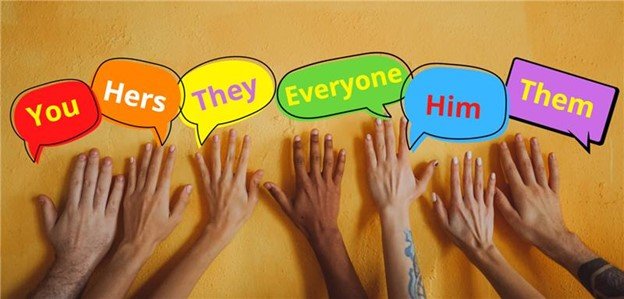I would not be honest if I did not start by stating that I'm guilty of this very thing. Yes, I think of myself as someone who attempts to preserve the integrity of a language. When I've learnt a new one, I try to learn the ins and outs, and usually dive head first into etymology to truly integrate concepts into my brain.

source
I begin confessing to my flaw, because I must recognize it as such if I'am to be honest with a reader, and to pave the way for the motivation for this blog entry.
Inclusive language
A few years ago, I would have retorted with a resounding "WTF?" at the very idea, but I'm beginning to come to grips with reality these days.
If you are not fully aware of what I'm talking about, I must say I'm curious as to how you've avoided the social tentacles of the "woke crowd".
You might be tempted to argue with me about the lack of harm in using preferred pronouns, or latinx to define an inclusive monolith, but the redundancy of it all is mentally painful at times for those of us who are sporting some gray in our beards.
I get it, but...
And to say that I don't would be hypocritical. I get that the idea is to protect sensibilities, to not exclude anyone, and not create out-groups in the workplace, in the gym, or in whatever social circumstance we may be in. But, this doesn't mean the good intentions are effective in a macro sense.
I've heard the argument that using a non-patriarchal language is the fist step to a better society, and maybe they are correct. Key word here being maybe.
You see, the world is not safe, and that's the big BUT that we can't avoid. People are going to hurt our feelings, they are going to exclude us, forget us, etc. And we, because I'm including myself in the exclusion; need to learn how to deal with it, how to surf those waters, how to escape uncomfortable situations, how to demand respect, etc.
but back to why...
I say I'm silly steward because
I've been arguing for the purity of languages, the sanctity, the correct usage of a pronoun, the etymology of a word and the conclusion is that: I'm not being realistic myself
A language does not need a steward. It might be that we adopt some of these things I reject, like using "they" instead of he or she, but regardless the outcome of it all won't be due to my actions or inactions.
We would not have multiple languages, dialects, or even slang terms if it was not for the simple fact that languages are alive. They evolve like everything else. The process may be slow, unnoticed, but if we zoom out, it's most definitely always drastic.
I can speculate, and feel comfortable with the idea that when the civilized world spoke mostly latin, there was a group of people attempting to stop the birth of the romance languages, and yet they had no idea that the process was already underway and inevitable.
Should I stop?
Guarding languages, that is?
I don't know. But I do know, that if I do so, if I fight back, or if I stay home, so to speak, it makes little to no difference.
That being said: I don't think I will purposely hurt someone's sensibilities by refusing to call them by their preferred pronouns. But, I doubt I will do good in remembering to swim against my own compulsions.
I will conclude with one point, and at least it's the one that I'm gripping on to for now. Social change can't truly happen by force, regardless of the intentions, and it does us good to remember that at all times. That goes for us, those who find this whole thing strange and difficult, and for those who think we are just geezers stuck in the mud of social inequality.
MenO
Languages do change despite the efforts of 'guardians'. They may say 'that word does not mean what you think', but meanings change. I think there can be cases for standards to try to make things understandable to a wide range of people. The UK has lots of regional dialects, but most of the country will understand most TV presenters.
The use of personal pronouns is an interesting one. I think it is part of realising that gender is not as binary as some like to think. It can make things awkward if you do not know what pronoun a person prefers for themselves, but they should respect you too. It has been said many times that word can't hurt you, even if they offend you. Respect counts for a lot and should be the default attitude. We do see a lot of name calling by people who want to stir up trouble and provoke a reaction. The best response is not to respond in kind.
im with you on this.. the waters are tricky, but applying kindness should, in most cases, work.
Regarding the standards, as you say: Well, that is precisely what changes, right? If enough people incorporate a slang term, or they change a word altogether, then it becomes the norm officially.